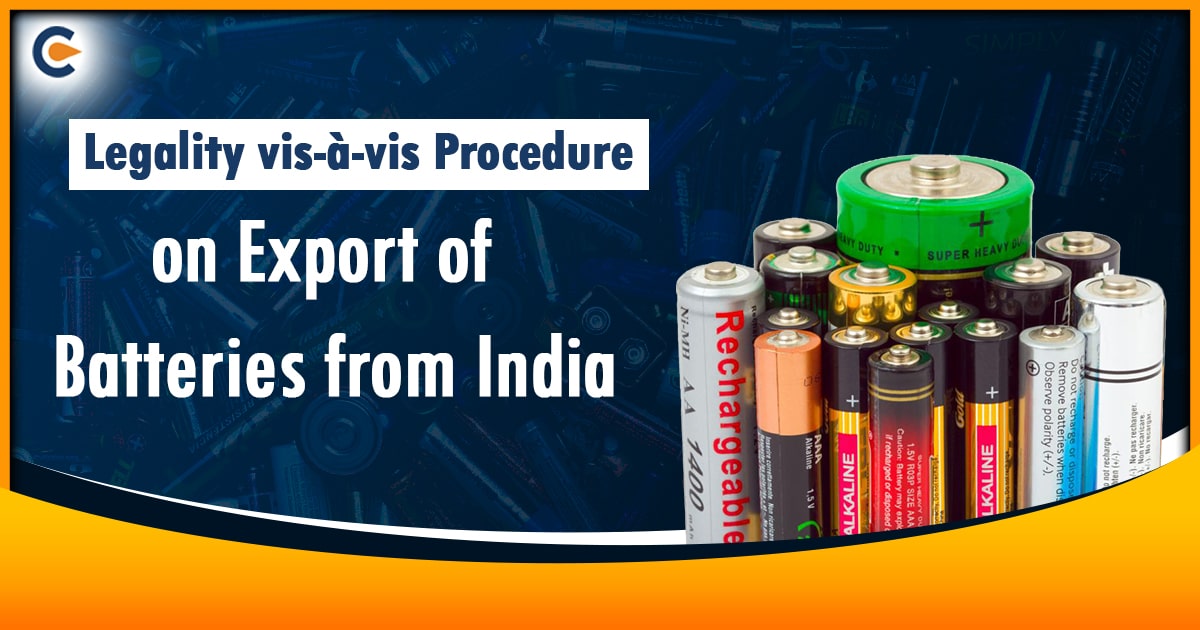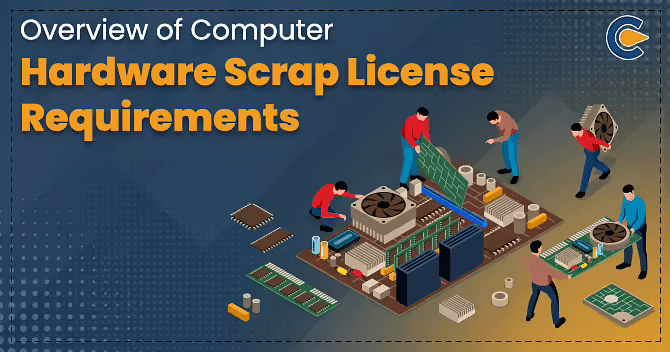Exporting batteries from India means selling and shipping batteries manufactured or sourced in India to customers or businesses in other countries. When any Indian company is involved in the sale of batteries, it is considered a commercial activity. Many types of batteries like automotive batteries, consumer electronic batteries, industrial batteries, etc.
The aim of exporting batteries from India is
- Reach to foreign market
- Expansion of business operations
- Generation of revenue with the help of international sales
While exporting, many steps are involved, like complying with export regulations, taking the mandatory permits and licenses, making sure of product quality and safety, packaging, labelling, customs clearance, and shipping to the destination country. The businesses involved in exporting batteries must comply with the rules and the procedure for smooth functioning legally and efficiently.
Key Elements for Export of Batteries from India
Export of batteries from India is a business concept that involves selling batteries produced or sourced in India to customers or entities in other countries. This concept encompasses several key elements related to the export of batteries from India:
- Product Selection: Businesses must decide which types of batteries they want to export. Automotive batteries, industrial batteries, and rechargeable batteries are included in this.
- Market Research: Before exporting, it’s essential to conduct market research to identify potential international markets and demand for the chosen battery products. It helps in understanding the preferences of customers, analyzing the competition, and complying with the regulatory requirements in the targeted market.
- Regulatory Compliance: Exporting batteries involves adhering to various national and international regulations. For disposal and recycling of batteries, the mandatory licenses and permits, export-import compliance laws, checking the meeting quality and safety standards, and keeping an eye on environmental regulations.
- Logistics and Shipping: Exporters must plan for the logistics of transporting batteries from India to the destination country. This includes selecting appropriate shipping methods (air, sea, and land), arranging for transportation, packaging batteries securely, and ensuring compliance with transportation regulations for hazardous materials (if applicable).
- Customs Clearance: Exporters must handle customs clearance procedures in India and the destination country. This includes providing the required documentation, paying any applicable customs duties or taxes, and complying with the import regulations of the destination country.
- Quality Assurance: Maintaining product quality is crucial to building a positive reputation in international markets. Businesses should look into implementing quality control measures so that expected standards are met.
- Market Expansion: Exporting allows businesses to expand their customer base beyond domestic borders, potentially increasing sales and revenue. For diversification strategy and the company’s growth, it’s important.
- Currency Exchange and Payment Processing: Exporting involves dealing with different currencies. The exchange rate fluctuations and payment methods for international transactions, such as letters of credit, wire transfers, etc., should be kept in mind.
- Market Adaptation: Depending on the target market, businesses may need to adapt their products to meet local preferences, regulations, or standards. The changes in labelling, packaging, or product features are included in this.
- Market Support: The exporter would be responsible for providing customer support, warranty services, and product information to their international customers. There is trust and customer satisfaction with this.
Exporters may need to provide their international customers with customer support, warranty services, and product information.
Steps for export of batteries from India
The export of batteries from India involves several steps and considerations. Here’s a general overview of the process:


- Research and Compliance: First, research the specific type of batteries you want to export and ensure they comply with Indian export regulations. Export requirements might differ with different batteries.
- Company Registration: Register your business and obtain the necessary licenses and permits for exporting goods from India. This often includes obtaining an Import Export Code (IEC) from the Directorate General of Foreign Trade (DGFT).
- Product Classification: Determine the Harmonized System (HS) code for your batteries. This code is used for customs and tariff needs and helps in classification.
- Quality Standards: Ensure that your batteries meet the quality and safety standards required for export. Different countries have different standards which need to be maintained.
- Packaging and Labeling: Properly package and label your batteries according to international shipping standards and any specific requirements of the destination country.
- Documentation: Prepare the necessary export documents, including the commercial invoice, packing list, bill of lading, certificate of origin, and any other documents required by the destination country.
- Customs Clearance: Work with a customs clearing agent or a freight forwarder to handle customs clearance at both the Indian end and the destination country.
- Shipping: Choose a shipping method (e.g., air, sea, and road) and a reliable logistics company to transport your batteries. Ensure that the shipping process complies with international regulations for transporting batteries.
- Export Declaration: File the export declaration with Indian customs. This can be done electronically through the ICEGATE portal.
- Destination Country Regulations: Research and comply with the import regulations and customs procedures of the destination country. Compliance with specific labelling and obtaining import permits are included in this.
- Export Documentation Submission: Submit all required export documents to customs and follow their procedures for export clearance.
- Payment and Insurance: Arrange for payment from the buyer and consider obtaining export credit insurance to mitigate financial risks.
- Track Shipment: Keep track of your shipment throughout its journey to ensure it reaches the destination safely and on time.
- Post-Export Documentation: After the shipment has been dispatched, ensure you have all the necessary documentation for record-keeping and compliance purposes.
- Follow-up: Stay in communication with the importer and address any issues or inquiries related to the shipment.
Legal provisions vis-à-vis export of batteries from India
The export of batteries from India involves compliance with various legal provisions and regulations. Understanding and complying with the legal requirements is necessary to ensure the export process is smooth. Here are some of the key legal provisions related to the export of batteries from India:
- Foreign Trade Policy (FTP): The FTP is a comprehensive document that outlines India’s policies related to foreign trade, including export promotion measures, export incentives, and export control regulations. Exporters should review the FTP to understand the current trade policies.
- Import Export Code (IEC): Obtaining an IEC is a legal requirement for anyone engaged in the export of goods from India. Directorate General of Foreign Trade (DGFT) issues the IEC, and it is also identified as an identification number for exporters.
Customs Act, 1962: The Customs Act governs the import and export of goods in India. Customs duties, process for customs clearance, and penalties for customs violations such provisions are included in this.
- Central Excise Act and Goods and Services Tax (GST): Batteries may be subject to central excise duties and GST. Understanding compliance with related tax regulations is an important aspect.
- Export Control Regulations: Certain types of batteries may be subject to export control regulations, especially if they have strategic or security implications. Exporters should check if their products fall under such regulations and obtain necessary clearances from relevant authorities.
- Bureau of Indian Standards (BIS): If the batteries are subject to mandatory quality standards, compliance with BIS requirements is essential. The quality and safety standards for many products, which includes battery, is stated under the BIS Act[1].
- Hazardous Substances and Chemicals Regulations: Batteries, particularly those containing hazardous materials, may be subject to specific regulations regarding the safe handling, transportation, and disposal of hazardous substances. It’s important to comply with the regulations.
- Export-Import Bank of India (EXIM Bank): EXIM Bank offers various financial and promotional schemes to support Indian exporters. Battery exporters should understand these schemes and make sure to access the available financial support could be helpful.
- Documentation Requirements: Ensuring accurate and complete export documentation, such as the export declaration, certificate of origin, and other relevant documents, is crucial to comply with customs and legal requirements.
- Trade Agreements and Tariff Preferences: If exporting to countries with India has trade agreements, exporters may benefit from tariff preferences. Familiarize yourself with the specific agreements and rules of origin to take advantage of these benefits.
- Sanitary and Phytosanitary (SPS) Measures: For batteries that may come into contact with food, water, or other products, compliance with SPS measures is essential. The designing of these measures is in accordance with the protection of human, animal, and plant health.
- Intellectual Property Rights (IPR): Ensure that your battery products do not infringe on any intellectual property rights, including patents, trademarks, or copyrights, held by others.
- Environmental Regulations: Be aware of environmental regulations related to the disposal and recycling of batteries in both India and the destination country, as improper disposal can lead to legal consequences.
Documents Required for Export of Batteries from India
The export of batteries from India requires specific documentation to comply with regulations and facilitate the shipping process. Here is a list of essential documents for exporting batteries from India:
- Commercial Invoice: This document contains details of the battery shipment, including the product description, quantity, unit price, total value, and payment terms. It is the evidence which shows the transaction between the exporter and the importer.
- Packing List: a complete detailed breakdown of the content of the shipment is there in the packing list. This list consists of types and quantities of batteries, packaging materials used, and weight and dimensions of each package.
- Bill of Lading (for Sea Freight) or Airway Bill (for Air Freight): These documents serve as the contract of carriage and receipt for the goods. It consists of details related to shipment for example, the shipper, consignee, shipping route, and terms of delivery.
- Certificate of Origin: This document certifies the country of origin of the batteries. It may be required for customs clearance and may need to be authenticated or notarized.
- IEC (Import Export Code): The IEC is a unique code issued by the Directorate General of Foreign Trade (DGFT) and is essential for all export transactions. The IEC must be outlined in the documents related to export.
- Pre-shipment Inspection Certificate (if required): Some countries or buyers may require a certificate confirming that the batteries meet specific quality and safety standards. The authorized inspection agencies are responsible for issuing this certificate.
- Export License (if applicable): Certain types of batteries or export destinations may require an export license. A check is needed to be done with the authorities to make sure that the export is meeting the requirements.
- Customs Declaration: You must file an export declaration with Indian customs. This can be done electronically through the ICEGATE portal.
- Quality and Safety Certificates (if applicable): Depending on the type of batteries, you may need to provide certificates demonstrating compliance with safety and quality standards, such as ISO certification or product-specific certifications.
- Shipping Instructions: These instructions guide the carrier on handling and transporting the batteries, including any special handling requirements.
- Insurance Certificate: If you have arranged for insurance coverage for your shipment, provide the insurance certificate or policy details.
- Letter of Credit or Payment Terms: Include any relevant financial documents or agreements, such as a Letter of Credit (if applicable) or information about the agreed-upon payment terms.
- Export Contract or Sales Agreement: This document outlines the terms and conditions of the sale, including payment terms, delivery terms, and any warranties or guarantees.
Important terms to understand related to the export of batteries from India
When there is an export of batteries from India, it’s important to be familiar with various terms and concepts related to international trade and logistics. Here are some important terms to understand:
- Export: The process of sending goods (in this case, batteries) from one country (India) to another for sale or use in the foreign market.
- Import: The process of bringing goods (batteries) into a country from another country for sale or use in the domestic market.
- Export Regulations: Government-imposed rules and requirements that govern the export of goods, including batteries. Licensing, documentation, and compliance with quality and safety standards these regulations are included under this.
- Import Regulations: Similar to export regulations but applicable in the destination country, outlining the requirements for importing batteries, such as customs procedures and product standards.
- Customs Duty: A tax or tariff imposed on imported or exported goods by the customs authority of a country. Exporters need to understand the customs duties applicable to their battery exports.
- HS Code: The Harmonized System Code is a standardized classification system for products used in international trade. Each type of battery has a specific HS code, which is used for customs clearance and tariff calculations.
- Incoterms (International Commercial Terms): A set of standardized trade terms that define the responsibilities of buyers and sellers in international transactions. Common Incoterms include EXW (Ex Works), FOB (Free On Board), and CIF (Cost, Insurance, Freight).
- Export License: A government-issued permit that may be required for certain types of batteries or specific export destinations. It authorizes the exporter to carry out the export.
- Certificate of Origin: A document that certifies the country in which the batteries were produced or manufactured. It may be necessary for customs clearance and to satisfy import regulations in the destination country.
- Letter of Credit (LC): A financial instrument issued by a bank that serves as a payment guarantee for the exporter. It ensures that the exporter will receive payment if the terms and conditions of the LC are met.
- Export Declaration: A formal document submitted to customs authorities providing details of the exported batteries, including quantity, value, and destination. For customs clearance, it is important.
Conclusion
The export of batteries from India is a complex but potentially lucrative endeavour. Careful planning is required for exporting from India, compliance with legal and regulatory authorities, and a detailed understanding of international trade practices. New revenue methods can be opened up, and business can be expanded globally, but there is a requirement of due diligence, preparation, and ongoing commitment to compliance and quality. With the right approach and attention to detail, exporting batteries from India can be a rewarding venture in the international marketplace.
FAQs
Yes, batteries can be exported from India. The battery is primarily exported from India to the United States, France, the Netherlands, China, and Singapore; the value of India’s total exports to these nations is 171.3 USD million, or 67.9% of the country’s overall exports of this commodity.
Yes, we can export lithium from India. India exports lithium for a total of 11.86 USD million to almost 110 nations and territories.
China is the biggest exporter of batteries. The company named “BUILD YOUR DREAMS” was founded by Chinese Chemist Wang Chuanfu and is one of China’s largest privately owned enterprises.
Lento is the best battery manufacturer in India (2023). The Battery Manufacturing sector manufactures a wide range of batteries, from single-cell alkaline batteries used in flashlights to multi-cell lithium-ion battery packs designed specifically for electric vehicle propulsion.
Tesla is the No. 1 battery company in the world with the Market Cap (Jul-30-2023) 844.48 billion USD
China has the most batteries and is the leader in the battery race, with nearly 80% of the global Li-ion manufacturing capacity.
The top 3 producers are Australia (61,000 mt), Chile (39,000) and China (19,000 mt) as updated in Year 2023.
The Harmonized System Code is a standardized classification system for products used in international trade. Each type of battery has a specific HS code, which is used for customs clearance and tariff calculations.
Read Our Article: How To Acquire A Battery Scrap Import License In India?











